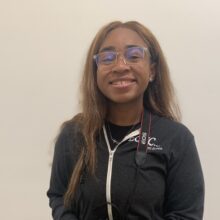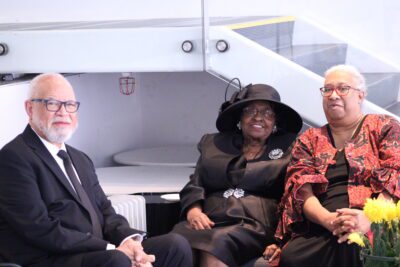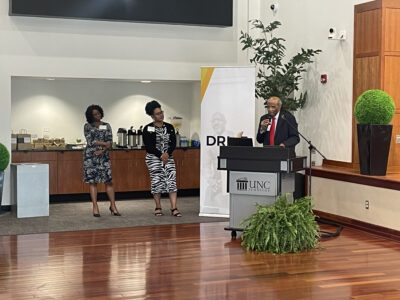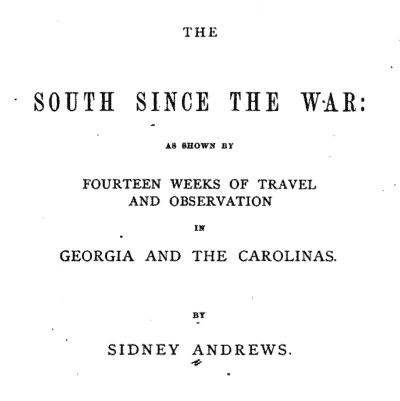
|
|
Contemporary art museum CAM Raleigh concluded their Juneteenth celebrations last weekend with a panel of local North Carolina civil rights activists from various fields.
Carmen Cauthen, Dr. Dudley Flood, Dr. Dumas Harshaw, and Dr. James Andrews were interviewed in the art museum on Sunday by radio host Damon Johnson. Each speaker shared their experiences in education, religion, labor rights, and historical research.
The conversation was a part of the Legends/Beloved Community project, organized by Dr. Terrance Ruth and Ann McColl.
The project features photos of six “living legends,” including those on the panel, who played formative roles in North Carolina education, religion, and politics. The exhibit features photos by Christopher Wilson, whose work was previewed June 20-22, and is set to display in spring 2025.
“All these Black elders have done extraordinary things throughout their lives you know in terms of equality,” Wilson previously said. “So I just wanted to do something that we felt that somehow could visualize their power and their beauty really.”
You can read more about each of the six “living legends” in the EdNC article below.
A shared history
Cauthen, an author and historian, said during the Sunday panel that she shares history to raise awareness between communities that may be having the same issues.
Her work focuses on documenting oral histories and family backgrounds. She has previously worked with the Wake County Housing Justice Coalition and North Carolina General Assembly.
“I don’t just try to settle things or deal with things for me,” Cauthen said. “I’m part of the beloved community, so it’s important to take the community with me everywhere I go.”
As the panelists recounted their upbringing, education was a through line in their stories.
Cauthen said her mother, who inspired her to be an activist, was a teacher.
Andrews, a U.S. Army veteran and retired president of the North Carolina AFL-CIO, recalled attending a small two-room school in Warren County as child. He said much of his life’s work has gone toward representing all workers through unions, and advocating for issues like paid holidays, minimum wage increases, and workplace safety measures.
As president of the AFL-CIO, he advocated for immigrant rights and visited labor camps to understand poor working conditions.
Harshaw, a retired pastor, said that after his family moved from Illinois, he was educated in Southern California from age 10 through the time he became a pastor. Beyond preaching in Los Angeles and Raleigh, he has served as a visiting or adjunct professor at several universities throughout the Triangle.
Dr. Dudley Flood is a former educator and administrator at the state Department of Public Instruction who played a key role in desegregating schools across North Carolina.
On Sunday, Flood said he attended segregated schools in North Carolina before becoming a teacher himself. He traveled the state during the 1960s and ’70s after the Supreme Court’s 1954 Brown v. Board of Education decision, with the goal of uniting communities and encouraging them to integrate.
While reflecting on his work, Flood addressed student behavior and discipline in schools today.
“To this day, the biggest problem education has is the discontinuity between home and school,” Flood said.
Flood said he has tried to communicate with parents to make “home more like school and school more like home.”
A shared future
While Flood spoke on discontinuity between home and school, Cauthen said she saw discontinuity within the community. She said she did not see leaders of different sectors coming together to help communities get the things they need.
“We don’t have to agree on everything. But we need to agree that there are issues (and) that it’s going to take all of us to fix, and I don’t see that anymore,” Cauthen said. “We could solve some of these issues that we have in our community without having to hope that somebody else comes in and fixes it for us. That’s the community I don’t see anymore, and that’s the community I want to go back to.”
Panelists said there is a continued need to fight for freedom, justice, and equity. Panelists also said that historical progress toward equal rights is regressing.
“I’m looking for the next generation to pick it up and continue because we are headed — in some areas — in the wrong direction,” Andrews said. “We are going backwards not forwards.”
Many of the panelists credited their work and legacy to their mentors.
Andrews said he was “standing on the shoulders of so many,” including leaders like A. Randolph Philip, who fought for issues such as minimum wage increases.
By teaching theology at universities, Harshaw said he gets to pass on what he learned from past mentors about organizing and social change through spiritual foundations.
“(It’s important) to understand our history, to understand where we came from, to understand who our people are, and to do enough research to know the story and understand the narrative, and then to apply that with the current contemporary situation,” Harshaw said.
Panelists said they try to educate and uplift the next generation through mentorship.
Cauthen said she invites people into her home to learn about her work as a historian.
Flood said he tries to build “leaders not followers.” He considers the team at the Dudley Flood Center For Educational Equity and Opportunity as a part of his legacy.
Panelists said that celebrating Juneteenth is a part of that education, but it is not enough. The event should also inspire people to continue the work, panelists said.
“It’s one thing to come to a party on Juneteenth but do you understand the backstory? That’s what’s important because that can empower us to have the kind of hope where we can continue to engage the struggle, not to romanticize it,” Harshaw said. “It’s beautiful, it’s history, but it’s just a format for ongoing struggle.”
Cauthen said that people can leverage all of the available technology they have to record their own family histories. She said people do not always believe what others tell them — and spoke about the importance of documenting history.
“We’re doomed to repeat it if we don’t know it,” Cauthen said. “We’re fighting stuff that should already have been won, if we don’t know it.”





